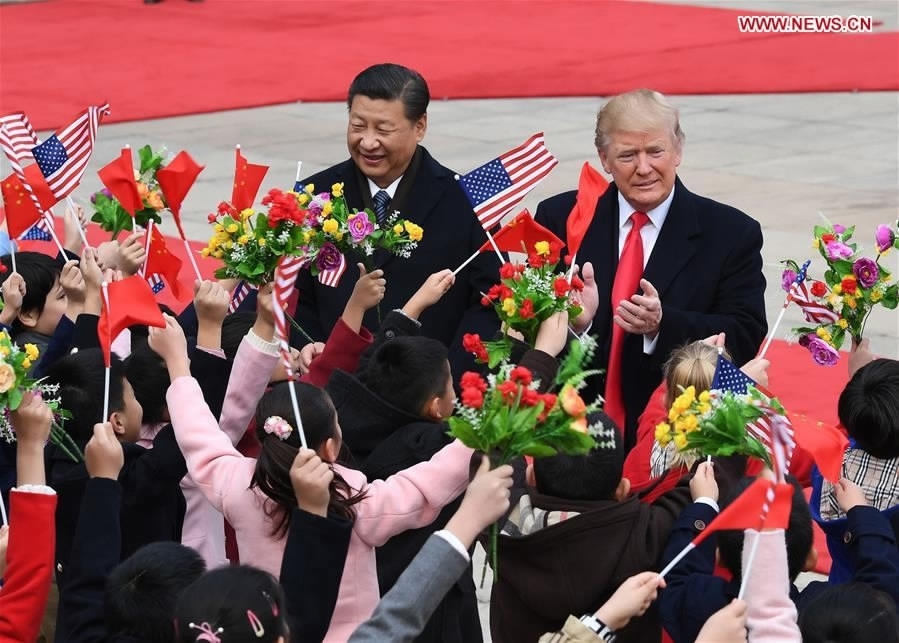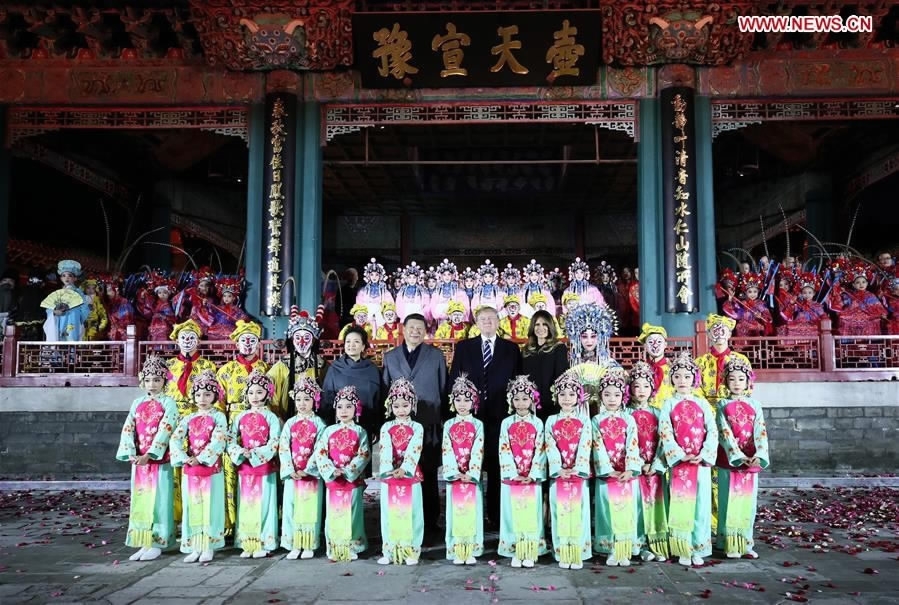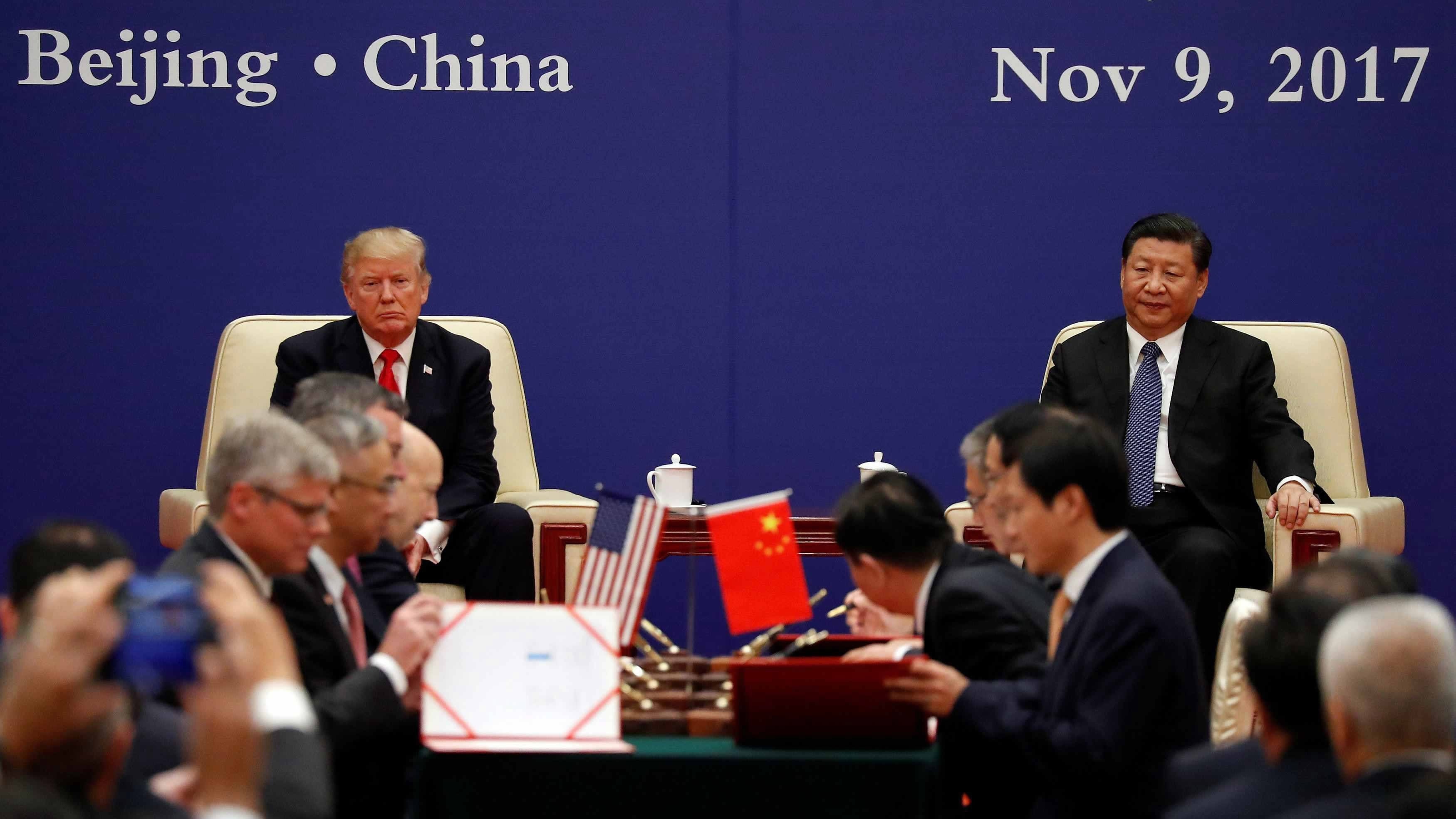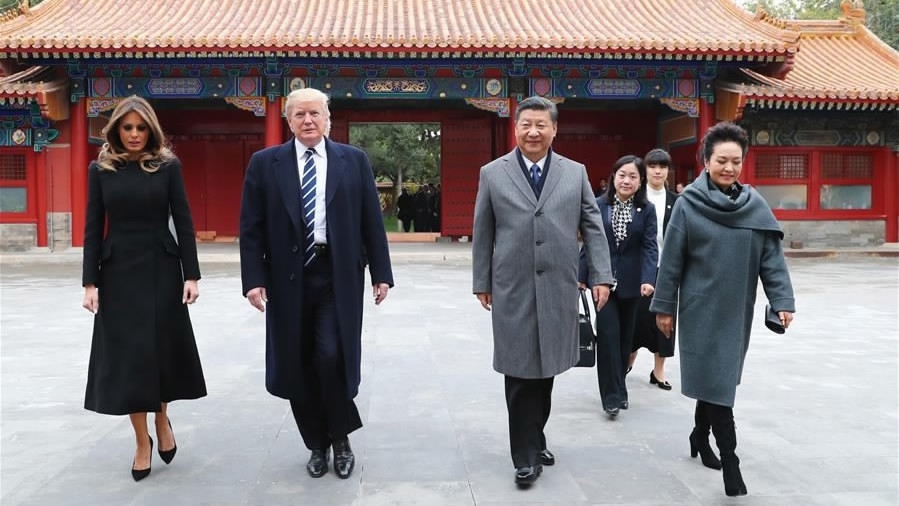Upon arriving in Beijing, Donald Trump was rushed directly from Beijing Capital International Airport to the Forbidden City , where President Xi Jinping received him. The symbolism was not lost to any Chinese observing. Foreign analysts are still trying to understand it.
This is the first time that a visiting foreign head of state has been received in the Forbidden City upon arrival since the Qing Dynasty. All have previously been received in the Great Hall of the People, Diaoyutai State Guest House, or the leadership compound in Zhongnanhai.
Amidst Beijing’s “golden autumn,” standing in the center of the Forbidden City where ancient foreign delegations once come to pay tribute, Xi explained to Trump that China’s civilization has had an unbroken continuity of 5,000 years. Xi was placing global geo-politics into a perspective different from narratives Trump may be used to at home. Among China’s many dynasties, some of the short ones lasted 200 years like America’s, some rendered to as footnotes. Others like Tang and Ming lasted many centuries. “We are descendants of the dragon,” explained Xi to Trump before signing US$250-billion worth of contracts, giving face to America’s president.

Chinese President Xi Jinping (L) holds a grand ceremony to welcome US President Donald Trump at the square outside the east gate of the Great Hall of the People in Beijing, capital of China, November 9, 2017. /Xinhua Photo
Chinese President Xi Jinping (L) holds a grand ceremony to welcome US President Donald Trump at the square outside the east gate of the Great Hall of the People in Beijing, capital of China, November 9, 2017. /Xinhua Photo
Many of the pavilions that they strolled through dated back specifically to the period of Emperor Qian Long (1711-1799), who some may argue was one of China’s most profound and outstanding emperors having brought China to become the most advanced civilization at that time. He ruled with principles of harmony found in Confucian, Buddhist and Taoist traditions – now being promoted under Xi’s administration as guoxue or “national studies.”
At that time in 1776, on the other side of the world, the American colonies declared independence from Britain. Europe was shocked as a once poor colony stood up, asserted itself, and established a new set of values and governance to meet new needs of a changing world order. The ballad “The World Turned Upside Down” was popular then.
One of China’s ancient 36 Strategies: Fanke weizhu “the guest becomes the host,” carries a similar ring. Ironically, in the era of China’s President Xi Jinping and America’s President Donald Trump, the perceived roles of China and America have switched dramatically. While European leaders may have traditionally adhered to American values of governance and development in their own decision-making, more are asking themselves what really are those values in today’s world?

Chinese President Xi Jinping and his wife Peng Liyuan, and US President Donald Trump and his wife Melania Trump pose for a photo with performers after watching a Peking Opera performance at the Palace Museum, or the Forbidden City, in Beijing, capital of China, November 8, 2017. /Xinhua Photo
Chinese President Xi Jinping and his wife Peng Liyuan, and US President Donald Trump and his wife Melania Trump pose for a photo with performers after watching a Peking Opera performance at the Palace Museum, or the Forbidden City, in Beijing, capital of China, November 8, 2017. /Xinhua Photo
President Donald Trump’s state visit to China comes at a time when Europe is trying to understand how to balance its own values against the new and old ones of both China and America concerning global trade, environment, and the United Nations. China has shifted to global center stage, leading by example rather than words, offering results rather than berating.
President Xi Jinping envisions a “community of common destiny for all mankind,” a concept embraced by the United Nations. This comes at a time when the political administration of President Donald Trump is calling for more protectionism, withdrawing America from global treaties, commitments and the UN.
As the two leaders stood in the Forbidden City with the world looking on, they symbolically represented very different trajectories for the planet:
- Trump has withdrawn America from the 2015 UN Paris climate accord, while Xi has made Ecological Civilization China’s national policy for environmental protection through unprecedented investments in renewable energy and the protection of natural assets.
- Trump has cut US aid programs for developing countries, while Xi’s Belt and Road Initiative is giving many underdeveloped nations unprecedented investment into the infrastructure and networks that they have been deprived of for decades.
- Trump has withdrawn America from UNESCO membership calling for disengagement from UN activities, while Xi is moving China into greater cooperation with UN agencies on all fronts, and China – on its current policy trajectory – may be the only country to actually achieve the UN 2030 sustainable development goals.
- Trump is calling for more action to alienate certain religious and ethnic groups and increased military spending to fight terrorism as it arises, while Xi calls for fighting terrorism at its root cause using the Belt and Road Initiative to offer security through programs of both economic empowerment, deepening cultural exchanges to enhance understandings and tolerance among people.
- Trump is seeking to end Obamacare, education and community programs for America’s down-trodden while Xi is committed to overall national health care reform and improvement while eliminating the last pockets of poverty in China.
- Trump sends via Twitter personal insults to DPRK’s leader at a time of great fragility and possible volatility on the Korean Peninsula, while President Xi advocates cool-headed and rational dialogue.

Chinese President Xi Jinping and US President Donald Trump witness the signing of commercial deals in Beijing on November 9, 2017. / Reuters Photo
Chinese President Xi Jinping and US President Donald Trump witness the signing of commercial deals in Beijing on November 9, 2017. / Reuters Photo
Upon arriving in China, Trump behaved more a businessman than politician, treating Xi with more deference and respect than Trump has shown to any European leader before. And after being received in the Forbidden City, Trump also received the benefit of US$ 250 billion worth of contracts to give his constituency companies in tow something to bring home. Yes, in many ways, it is a world turned upside down.
(Laurence Brahm is a founding director of the Himalayan Consensus Institute and a Senior Fellow with the Center for China and Globalization. He has lived and worked in China for 25 years and is the author of over 20 books on the Asian region. His work covers a wide spectrum from economic development reform in China and Southeast Asia to Tibetan new age travel. He is the author of Zhu Rongji and the Transformation of Modern China and China as No. 1. His books on Tibet include Searching for Shangri-la: Off the Beaten Track in Western China and Conversations with Sacred Mountains: A Journey along Yunnan's Tea Caravan Trail. The article reflects the author's opinion, and not necessarily the views of CGTN.)





